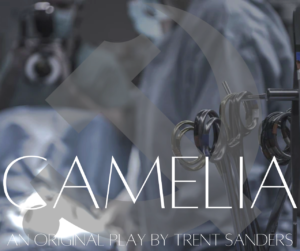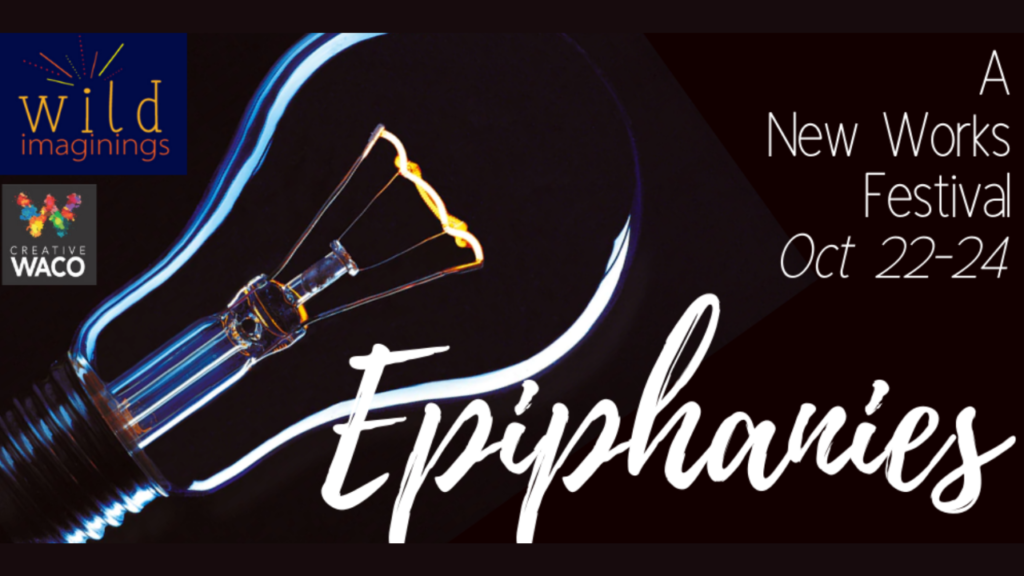Camelia: A New Play in Search of a Stage in Waco
By Trent Sanders
(You can learn more about “Epiphanies” a new works festival being staged by Wild Imaginings, in Trent Sutton’s blog post from last week. – ALW)
I first heard about Trent and his theatre company, Wild Imaginings, in a funny sort of way. Luann Jennings, founding artist of InSite theatre company in Waco, had invited me to co-direct a show. I accepted, and her welcome to me went, “You’re Trent 2.0.” I thought, “Like Tosh?” To say the least, this name intrigued me. Trent Sutton had directed shows in Waco for a number of years and had recently formed his own company. I wondered under what circumstances I would meet Trent 1.0. All this took place in early 2020, before the shutdowns.
Eighteen months earlier, in October 2018, my wife, three-month old son, and I had moved to Romania. The U.S. Bureau of Educational and Cultural Affairs had awarded me a Fulbright Creative Arts and Performance grant. My stated purpose was to study and write a play about Romanian Christian exiles fleeing the threat of the Romanian Communist Party. Ironically, a year later, in September 2019, I learned that many of these people had moved to the U.S. Some of you may have heard of Lucy Lupu. She and her husband, Petru, have a harrowing story of escape by night. Yet, for my purposes, a different and significant batch of Romanians were still living in Romania.
I told Trent 1.0 all this after the last performance of InSite’s Shakespeare mashup, “Law and Order.” He was kind enough to listen with enthusiasm, then asked me what I did instead. Enter Camelia.

The play is her namesake and her song. She sings of her family, their flight from murderers coming from the East, their saga as refugees, and their multi-generational fight against a broken system. She sings of Romania. Camelia Doru was born in Călimănești – a small village in the Transylvanian Alps. There, she spent her formative years listening to the conversations of many, now famous, Romanian literary dissidents, who were sent there, on the Romanian Communist Party’s dime, to write propaganda (though they never did). She sets out on a journey, armed with her wit against the darkness, to redeem her own history, and by extension, Romania’s.
Trent 1.0 did that sort of frown you do when you hear something you like but have nothing else to add. I said one more thing.
While interviewing Camelia, she mentioned a summit she had attended in 1991. She went on to say the Rockefeller Foundation had summoned the world’s leading torture experts there. He was caught off guard – there are torture experts? Yep. I continued. They met in order to create a tactical map to end torture. Over the course of a week, they mapped out the terrible constellation of torture. Amazed, I asked her if she had a copy. She then rolled out a 100 square foot map. At the center of this nearly invisible universe is the torturer and the victim.
This might sound thought out, but the play was in rough shape when I first showed it to Trent 1.0. He and I both agreed that, in its current form, it had no place in Waco, likely not in Texas, and just a sliver of a chance in the U.S. It was too symbolic. Romanians love that sort of thing, but not so much the Americans.
He prompted me to form it around a question, then to rewrite it according to the question. After that, the play returned to some semblance of its roots. It had begun as an oral history – with me sitting down in Camelia’s office in Bucharest. Asking her questions. Listening. Later on, transcribing. After some thought, I began to ask two big questions: Is her story about how to redeem history? – At least, a kind of redemption in continuum? Is religion somehow involved?
In any case, he asked me to submit the play for his company’s festival, so I did. By April, he informed me that it had been one of eight chosen for a table reading. Fast forward into early May, Trent 1.0 and the actors had done a remarkable job reading and responding to the script. After three hours of this via zoom, I had a great air of confidence for the revisions that lay ahead. And I knew what symbolism to get rid of and how. Camelia’s world, literally closed off to the West until 1989 because of the Iron Curtain, and literarily closed off to the West until June 2020 because of my bad writing – was now readily accessible. I hope it lets you get her. I hope her wit gets you.
But you be the judge on Saturday October 24 at 6:30 PM when Camelia begins streaming. You can purchase a ticket to the festival by clicking here. The cost is $15.
I almost forgot to mention two more things. The problem with faith (and herein lies its power) is that it is incarnational. Culture, place, and era embody it. In Camelia, you will see this conflict: an irreligious woman, encountering godless problems, all while facing God. Is anything out of his purview?
That being so, Camelia loves democracy – the American kind – and I think that shines through. If you love democracy, this is a play for you. If you want to be a part of a conversation about a more perfect union, this play is a great conversation starter.
Peace be with you.

Trent Sanders holds two degrees (B.A. and M.A.) in literature and criticism. After completing his studies, he spent a year studying and making theatre on a Fulbright in Romania. He is currently the playwright in residence at Baylor’s Institute for Oral History.
The Act Locally Waco blog publishes posts with a connection to these aspirations for Waco. If you are interested in writing for the Act Locally Waco Blog, please email [email protected] for more information.

